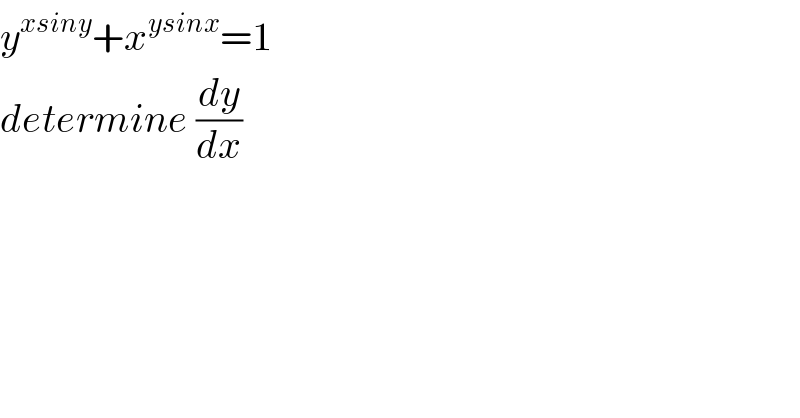
Question and Answers Forum
Question Number 49845 by mhozhez last updated on 11/Dec/18

Commented by MJS last updated on 11/Dec/18
![try this for yourself. the method is simple: t_i (x,y) are terms in x and y t_1 (x,y)+t_2 (x,y)+...=0 is the same as Σ_(i=1) ^n t_i (x,y)=0 now derivate dxΣ_(i=1) ^n (d/dx)[t_i (x,y)]+dyΣ_(i=1) ^n (d/dy)[t_i (x,y)]=0 ⇒ (dy/dx)=−((Σ_(i=1) ^n (d/dx)[t_i (x,y)])/(Σ_(i=1) ^n (d/dy)[t_i (x,y)])) an example ax^2 +bxy+cy^2 +dx+ey+f=0 dx(2ax+by+0+d+0+0)+dy(0+bx+2cy+0+e+0)=0 dx(2ax+by+d)+dy(bx+2cy+e)=0 (dy/dx)=−((2ax+by+d)/(bx+2cy+e))](Q49849.png)
Answered by tanmay.chaudhury50@gmail.com last updated on 11/Dec/18
![u=y^(xsiny) lnu=xsinylny (1/u)×(du/dx)=xsiny×(1/y)(dy/dx)+xlny×cosy×(dy/dx)+sinylny (du/dx)=y^(xsiny) [(dy/dx)(((xsiny)/y)+xcosylny)+sinylny] v=x^(ysinx) lnv=ysinxlnx (1/v)(dv/dx)=((ysinx)/x)+ylnxcosx+sinxlnx(dy/dx) (dv/dx)=x^(ysinx) (((ysinx)/x)+ylnxcosx+sinxlnx(dy/dx)) u+v=1 (du/dx)+(dv/dx)=0 y^(xsiny) [(dy/dx)(((xsiny)/y)+xcosylny)+sinylny]+x^(ysinx) [((ysinx)/x)+ylnxcosx+sinxlnx(dy/dx)]=0 (dy/dx)[y^(xsiny) (((xsiny)/y)+xcosylny)+(x^(ysinx) sinxlnx)]=−[x^(ysinx) (((ysinx)/x)+ylnxcosx)+y^(xsiny) (sinylny)] (dy/dx)=((−[x^(ysinx) (((ysinx)/x)+ylnxcosx)+y^(xsiny) (sinylny)])/([y^(xsiny) (((xsiny)/y)+xcosylny)+(x^(ysinx) sinxlnx)])) it is the answer...](Q49847.png)
| ||
Question and Answers Forum | ||
Question Number 49845 by mhozhez last updated on 11/Dec/18 | ||
 | ||
Commented by MJS last updated on 11/Dec/18 | ||
![try this for yourself. the method is simple: t_i (x,y) are terms in x and y t_1 (x,y)+t_2 (x,y)+...=0 is the same as Σ_(i=1) ^n t_i (x,y)=0 now derivate dxΣ_(i=1) ^n (d/dx)[t_i (x,y)]+dyΣ_(i=1) ^n (d/dy)[t_i (x,y)]=0 ⇒ (dy/dx)=−((Σ_(i=1) ^n (d/dx)[t_i (x,y)])/(Σ_(i=1) ^n (d/dy)[t_i (x,y)])) an example ax^2 +bxy+cy^2 +dx+ey+f=0 dx(2ax+by+0+d+0+0)+dy(0+bx+2cy+0+e+0)=0 dx(2ax+by+d)+dy(bx+2cy+e)=0 (dy/dx)=−((2ax+by+d)/(bx+2cy+e))](Q49849.png) | ||
Answered by tanmay.chaudhury50@gmail.com last updated on 11/Dec/18 | ||
![u=y^(xsiny) lnu=xsinylny (1/u)×(du/dx)=xsiny×(1/y)(dy/dx)+xlny×cosy×(dy/dx)+sinylny (du/dx)=y^(xsiny) [(dy/dx)(((xsiny)/y)+xcosylny)+sinylny] v=x^(ysinx) lnv=ysinxlnx (1/v)(dv/dx)=((ysinx)/x)+ylnxcosx+sinxlnx(dy/dx) (dv/dx)=x^(ysinx) (((ysinx)/x)+ylnxcosx+sinxlnx(dy/dx)) u+v=1 (du/dx)+(dv/dx)=0 y^(xsiny) [(dy/dx)(((xsiny)/y)+xcosylny)+sinylny]+x^(ysinx) [((ysinx)/x)+ylnxcosx+sinxlnx(dy/dx)]=0 (dy/dx)[y^(xsiny) (((xsiny)/y)+xcosylny)+(x^(ysinx) sinxlnx)]=−[x^(ysinx) (((ysinx)/x)+ylnxcosx)+y^(xsiny) (sinylny)] (dy/dx)=((−[x^(ysinx) (((ysinx)/x)+ylnxcosx)+y^(xsiny) (sinylny)])/([y^(xsiny) (((xsiny)/y)+xcosylny)+(x^(ysinx) sinxlnx)])) it is the answer...](Q49847.png) | ||
| ||